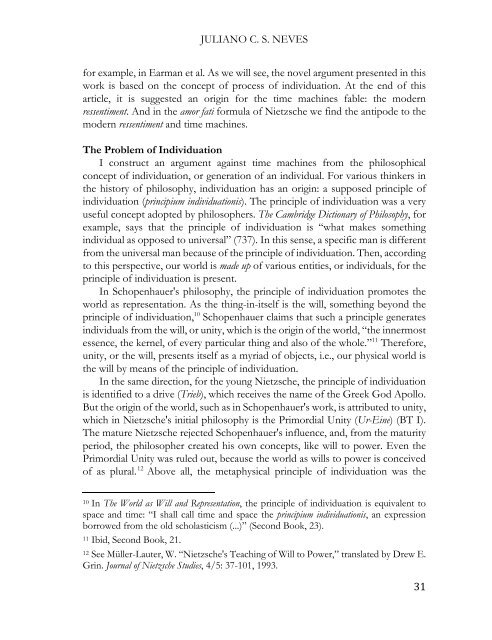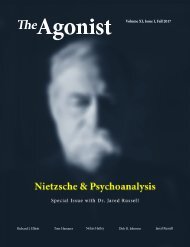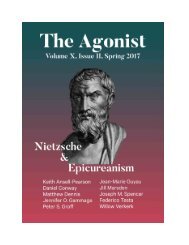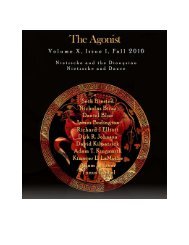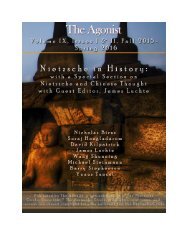Volume XII, Issue II, Spring 2019
Create successful ePaper yourself
Turn your PDF publications into a flip-book with our unique Google optimized e-Paper software.
JULIANO C. S. NEVES<br />
for example, in Earman et al. As we will see, the novel argument presented in this<br />
work is based on the concept of process of individuation. At the end of this<br />
article, it is suggested an origin for the time machines fable: the modern<br />
ressentiment. And in the amor fati formula of Nietzsche we find the antipode to the<br />
modern ressentiment and time machines.<br />
The Problem of Individuation<br />
I construct an argument against time machines from the philosophical<br />
concept of individuation, or generation of an individual. For various thinkers in<br />
the history of philosophy, individuation has an origin: a supposed principle of<br />
individuation (principium individuationis). The principle of individuation was a very<br />
useful concept adopted by philosophers. The Cambridge Dictionary of Philosophy, for<br />
example, says that the principle of individuation is “what makes something<br />
individual as opposed to universal” (737). In this sense, a specific man is different<br />
from the universal man because of the principle of individuation. Then, according<br />
to this perspective, our world is made up of various entities, or individuals, for the<br />
principle of individuation is present.<br />
In Schopenhauer's philosophy, the principle of individuation promotes the<br />
world as representation. As the thing-in-itself is the will, something beyond the<br />
principle of individuation, 10 Schopenhauer claims that such a principle generates<br />
individuals from the will, or unity, which is the origin of the world, “the innermost<br />
essence, the kernel, of every particular thing and also of the whole.” 11 Therefore,<br />
unity, or the will, presents itself as a myriad of objects, i.e., our physical world is<br />
the will by means of the principle of individuation.<br />
In the same direction, for the young Nietzsche, the principle of individuation<br />
is identified to a drive (Trieb), which receives the name of the Greek God Apollo.<br />
But the origin of the world, such as in Schopenhauer's work, is attributed to unity,<br />
which in Nietzsche's initial philosophy is the Primordial Unity (Ur-Eine) (BT I).<br />
The mature Nietzsche rejected Schopenhauer's influence, and, from the maturity<br />
period, the philosopher created his own concepts, like will to power. Even the<br />
Primordial Unity was ruled out, because the world as wills to power is conceived<br />
of as plural. 12 Above all, the metaphysical principle of individuation was the<br />
10 In The World as Will and Representation, the principle of individuation is equivalent to<br />
space and time: “I shall call time and space the principium individuationis, an expression<br />
borrowed from the old scholasticism (...)” (Second Book, 23).<br />
11 Ibid, Second Book, 21.<br />
12 See Müller-Lauter, W. “Nietzsche's Teaching of Will to Power,” translated by Drew E.<br />
Grin. Journal of Nietzsche Studies, 4/5: 37-101, 1993.<br />
31


